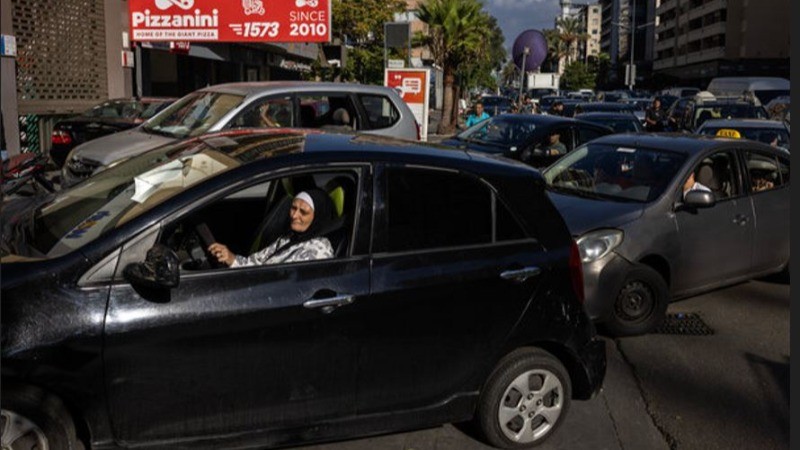
The reality of the escalating conflict hit Beirut hard on Monday after a series of attacks across southern Lebanon. For many living in the Lebanese capital, the fear of the war reaching their city became palpable.
The day began with warnings sent by Israel to local radio stations and some cellphones in Beirut, cautioning of imminent military action. "The IDF will be moving against military bases," said an automated message, referring to the Israel Defense Forces. "The IDF don't want to hurt you. If you are present in a building used by Hezbollah, you should leave."
These messages caused widespread panic, especially in the southern suburbs, where Hezbollah, the Lebanese militant group, has a strong presence. Parents rushed to pick up their children from schools. By the afternoon, long lines of vehicles stretched from fuel stations and snaked through the streets as residents attempted to flee, seeking safety in Lebanon’s northern mountains. Others hurriedly gathered supplies, filling grocery carts with essentials like water, rice, and oil, amid the growing uncertainty.
Meanwhile, news updates on residents' phones continuously reported over 1,000 Israeli airstrikes pounding southern Lebanon. Having experienced years of conflict, many believed they knew what would come next.
"It’s a war," said Daher Amdi, 34, who was sitting outside an almost deserted café, smoking a cigarette.
Tensions in Beirut intensified as Israel's strikes against Hezbollah increased. Monday’s attacks were the deadliest Lebanon had seen since 2006, leaving hundreds dead and thousands injured, particularly in the south. With both sides vowing to escalate the conflict, residents feared Beirut could soon be drawn into full-scale warfare.
Late in the morning, Lebanon’s education ministry ordered some public and private schools to close, citing "security and military situations" that posed risks to students. Outside one school in eastern Beirut, secondary students waited to be picked up, while younger children clutched their parents' hands as they hurried out.
Joaelle Naser, 44, was there to collect her three daughters. "I am scared, I’m scared," Naser said, standing with her two youngest girls, both with colorful scrunchies holding their ponytails in place. "I’m not prepared for what might happen."
As the day wore on, the devastation from Israel’s bombardment became clearer. Footage of thick plumes of smoke rising from southern villages played across news outlets, and the death toll steadily climbed.
In a predominantly Sunni neighborhood in western Beirut, 75-year-old Habib Bazzi, originally from Bint Jbeil near Lebanon’s southern border, stepped outside for a break after watching the destruction unfold on television all day. "I’m heartbroken," Bazzi said. "What else can I say?"
In a grocery store at City Center Mall near Beirut's southern suburb of Dahiya, 38-year-old Mirna and her son filled two shopping carts with bags of essentials. Mirna, a resident of Dahiya, where an explosion recently killed several senior Hezbollah commanders, expressed her concerns. "I told my husband we should leave, we should definitely leave soon," she said.
Nearby, Lama Abdul Sater, standing at her watch stand in the mall, kept her handbag close by, containing two passports. Her husband had advised her to keep them ready in case they had to evacuate suddenly. "Death is very close," she whispered, ensuring her 10-year-old daughter didn’t hear. "Any decision I make might not be the right one, I’m not sure about anything," she added.
Lebanese residents are no strangers to tough decisions, given the country’s ongoing political and economic crises. Since 2019, Lebanon has been grappling with economic collapse, and the current caretaker government has struggled to provide basic services. For many, another war is the last thing they want.
"It’s not the time for this war," said 37-year-old Bilal Borjawi, who once ran a successful tourism agency. Now, Borjawi works as a security guard, earning just a fraction of what he once made. "We cannot afford more pressure than we already feel right now," he said.
Despite the hardships, Lebanese resilience remains. At a gas station in west Beirut, drivers impatiently honked, anxious to fill their tanks. Farid, a man in his 30s, was preparing to leave for eastern Lebanon with his family. "My family is really panicked, they’re crying and scared," he said as he paid for the fuel. "I keep telling them we won’t be bombed here, but honestly, I don’t know."
By the evening, Beirut’s worst fears were realized. Around 6:30 p.m., news of another strike in the city flashed across screens, signaling the war had drawn closer to home.